Development Economics and Policy
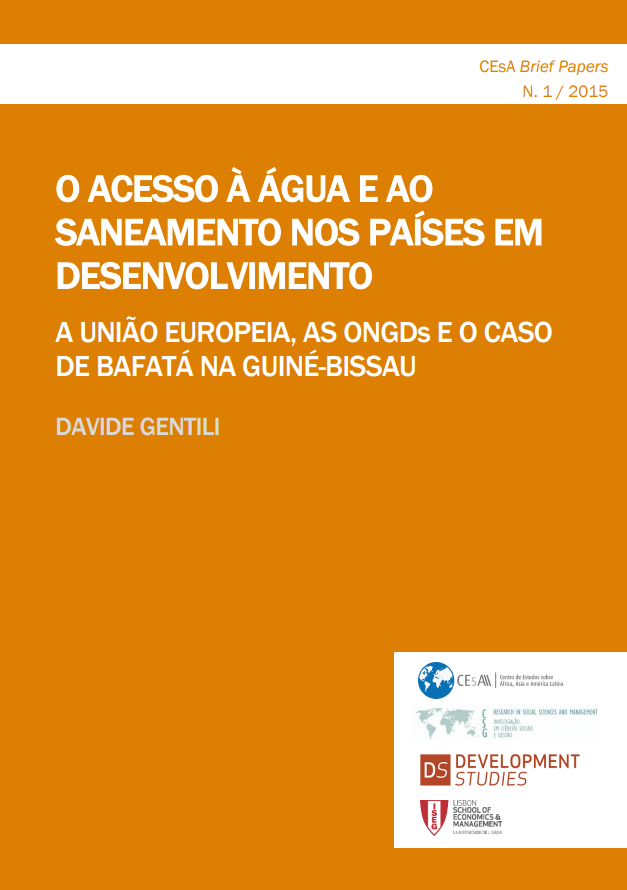
Brief Paper 1/2015: O Acesso à Água e ao Saneamento nos Países em Desenvolvimento: a União Europeia, as ONGDs e o caso de Bafatá na Guiné-Bissau
Abstract:
O acesso à água e ao saneamento nos países em desenvolvimento : a União Europeia, as ONGDs e o caso de Bafatá na Guiné-Bissau is born from the readaptation of the master’s thesis “Access to water and sanitation in developing countries: the European Union, NGDOs and the case of Bafatá in Guinea Bissau” carried out during 2014 and defended in November of the same year. The work is part of the theme of international cooperation with Developing Countries (DP) in the sector of water, sanitation and hygiene (WASH)3 and aims to investigate how good practices, agreed by international donors, for access to water and sanitation, influence the work of NGDOs operating in this sector. Thus, we sought to analyze how the European Union (EU), the most important donor in the WASH sector at an international level, has influenced the work in the WASH sector of the Portuguese NGDO – TESE – Associação para o Desenvolvimento. We tried to observe how TESE interprets the EU guidelines in the WASH sector, trying to understand if there is a blind adaptation to the guidelines in order to capture the funds, or if, on the contrary, there is a vision that guides the actions of TESE independently the availability of funding. In the first decade of the 2000s, the EU has strengthened its commitment to the WASH sector, funding numerous cooperation projects and actively contributing to the international political debate. Among the criteria that led to the choice of TESE, in addition to its geographical proximity and the opportunity to collaborate with the organization’s members, is the fact that it is one of the few NGDOs in Portugal committed to cooperation in the WASH sector in the Portuguese-speaking space. This, over the last decade, has established itself as a reference organization in the panorama of Portuguese NGDOs, being involved in several projects in the water and sanitation sector. Since its birth until today, there has been a substantial evolution of the organization, which now has a stable structure and well-defined objectives. Over time, TESE defined an intervention model specific to the organization. Among the projects carried out, one stands out, Bafatá Misti Iagu (BMI), co-financed by the EU in Bafatá, Guinea Bissau (GB). This will be the object of analysis as a case study. Between February and May 2014, the daily work of the TESE headquarters in Lisbon was monitored. Documents guiding EU cooperation and funding lines in the WASH sector were analyzed and compared with the results of the case study on Bafatá, writing the intervention context of the BMI project. from the analysis of documents of the projects carried out by TESE, from the evaluations of the projects and from the interviews carried out with current and previous members of the NGDO5. The comparison was mainly focused on: (1) the desired objectives, the target groups, the proposed actions and the approach promoted in the actions; (2) the approach to the key issues of access and management of water services. Here, we sought to compare the principles inherent to institutional and management issues (What is the resource management model that is promoted?), social and economic (What is the value attributed to water, in equity, in human rights, in gender equity? , in the quality of services promoted, and in questions of ownership, price, pricing of services?), and finally environmental, information, education, communication and technology6. This analysis resulted in a substantial approximation between the EU guidelines and the projects carried out by TESE. This result becomes more interesting considering that the line of financing with which TESE financed the BMI project in 2009 did not include specific guidelines on the water sector and the definition of objectives, expected results, activities and more in general. approach and is not subject to EC eligibility criteria in the WASH sector. Regarding the desired objectives, target groups, proposed actions and the approach promoted in the actions, there is a high correspondence of vision. TESE’s actions encompass both an infrastructural component (construction and rehabilitation of infrastructure, implementation of pollution prevention and water protection measures), and measures aimed at improving resource management in order to guarantee the durability of the intervention (awareness of the correct use of resources and education for hygiene, strengthening and management of institutions in the water sector). Among the measures shared by the EU and TESE aimed at resource management is the demand management, which, however, was not applied indiscriminately in the projects carried out by TESE, and each time there was a prior identification of the context and the your needs. The affinity of vision between EC and TESE remains constant, albeit with some difference, looking at the key access and management principles applied in the implementation of the BMI project (See Table A). This did not come about through the opening of a line of financing, but through the identification of the needs and opportunities for cooperation in Bafatá, in a perspective of complementarity and integration with other ongoing initiatives. The expected results were not defined to meet the eligibility conditions of the Call for Proposal -CfP-, but to have the best impact from the point of view of economic, human and environmental sustainability. The definition of these results derives from TESE’s own intervention pattern, which may change according to the context and requirements of the financing lines, but which in substance is not changed. Through the analysis of the projects carried out by TESE, it was possible to identify an intervention model of the organization. This model, the common thread between the projects, is an integral part of its cooperation strategy. Taking into account what has been observed, it can be said that TESE has a vision that guides its actions in the WASH sector, not limiting itself to applying ipsis verbis what is required in the EC CfPs. However, as we have seen, there is a good match between the objectives and good practices approved by the EC and the vision and work of TESE. Comparing the objectives, principles and proposed actions, it can be deduced that, taking as an example the application of the demand management principle, there is no implementation of internationally recognized good practices without a prior analysis of the intervention context.
Quotation:
Gentili, Davide (2015). “O acesso à água e ao saneamento nos países em desenvolvimento : a União Europeia, as ONGDs e o caso de Bafatá na Guiné-Bissau”. Instituto Superior de Economia e Gestão – CEsA Brief papers nº 1-2015.
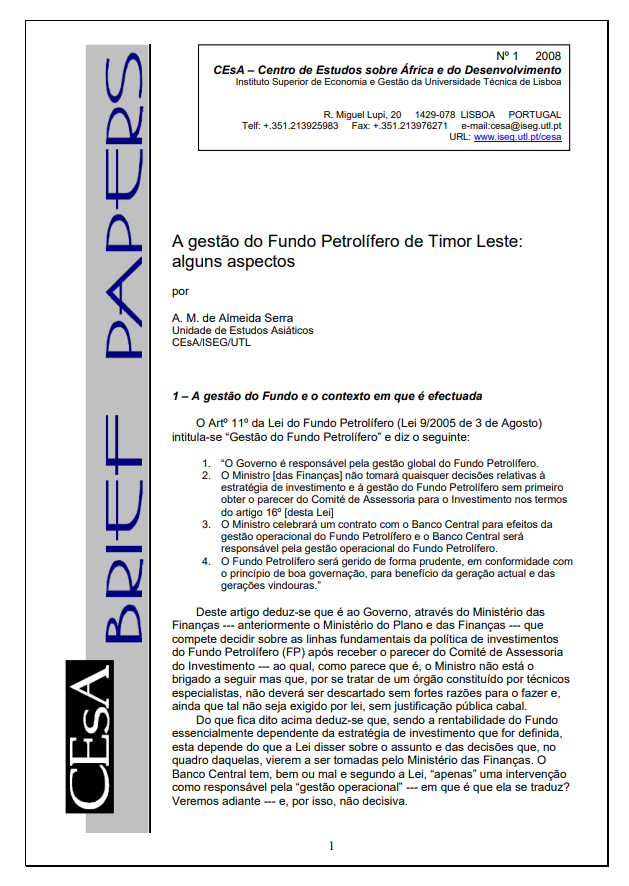
Brief Paper 1/2008: A Gestão do Fundo Petrolífero de Timor Leste: Alguns aspectos
Abstract:
The Article 11 of the Petroleum Fund Law (Law 9/2005 of 3 August) deduces that the Government, through the Ministry of Finance – formerly the Ministry of Planning and Finance – is responsible for deciding on the fundamental lines of the investment policy of the Petroleum Fund (PF) after receiving the opinion of the Investment Advisory Committee – to which, as it appears to be, the Minister is not bound to follow, but since it is a body made up of technical experts, it should not be dismissed without strong reasons to do so, and even if this is not required by law, without full public justification. As indicated by the characteristics of the series of CEsA texts in which it is published – its Brief Papers – A gestão do fundo petrolífero de Timor Leste: alguns aspectos should be understood as corresponding to a (little more than) initial phase of research on the topic we have proposed to study. Therefore, its conclusions – if we can speak of true conclusions or even lessons – are merely provisional and subject to some modification as a result of the continued research we have been doing on the subject. For this reason, and as much or more than in other circumstances, an appeal to the reader to let us know his opinions on what has been written, including possible inaccuracies in the approach to the subject, makes sense.
Quotation:
Serra, António M. de Almeida. 2008. “A gestão do fundo petrolífero de Timor Leste: alguns aspectos”. Instituto Superior de Economia e Gestão – CEsA Brief papers nº 1-2008.
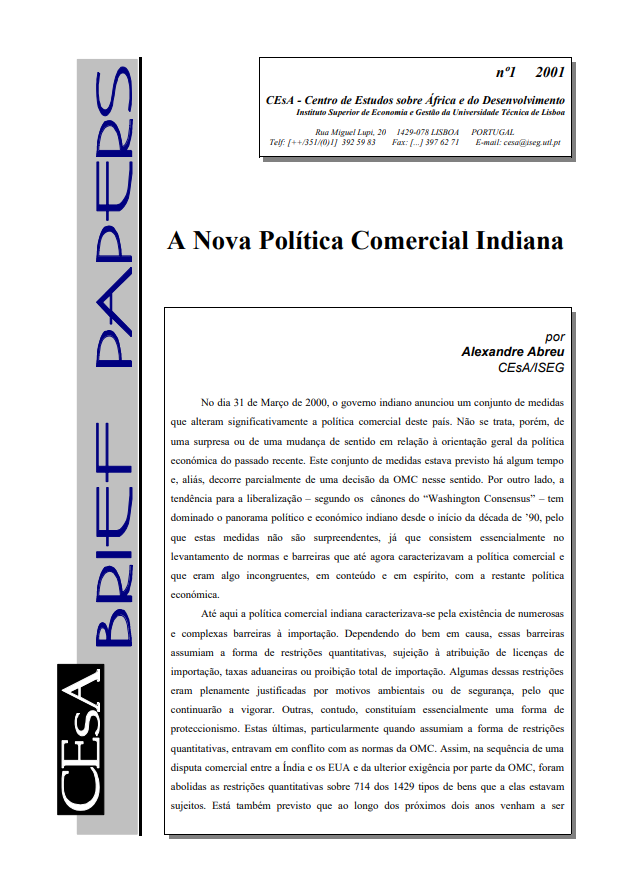
Brief Paper 1/2001: A Nova Política Comercial Indiana
Abstract:
On 31 March 2000, the Indian government announced a set of measures that significantly alter this country’s trade policy, studied in A nova política comercial indiana (The New Indian Trade Policy). This is not, however, a surprise or a change of direction in relation to the general orientation of the economic policy of the recent past. This set of measures was foreseen some time ago and, moreover, partly stems from a WTO decision to that effect. On the other hand, the trend towards liberalisation – along the lines of the “Washington Consensus” – has dominated the Indian economic and political landscape since the early 1990s. Hitherto Indian trade policy was characterised by the existence of numerous and complex import barriers. Depending on the good concerned, these barriers took the form of quantitative restrictions, import licensing, tariffs or a complete ban on imports. Some of these restrictions were fully justified on environmental or safety grounds and will therefore remain in place. Others, however, were essentially a form of protectionism. The latter, particularly when they took the form of quantitative restrictions, conflicted with WTO rules. Thus, following a trade dispute between India and the US and subsequent WTO demand, quantitative restrictions on 714 of the 1429 types of goods that were subject to them were abolished. It is also expected that over the next two years many of the remaining restrictions will be removed or reduced, in particular all quantitative restrictions – with the exception, as already mentioned, of those for environmental or safety reasons – and a substantial part of customs duties.
Quotation:
Abreu, Alexandre. 2001. “A nova política comercial indiana”. Instituto Superior de Economia e Gestão – CEsA Brief papers nº 1-2001.
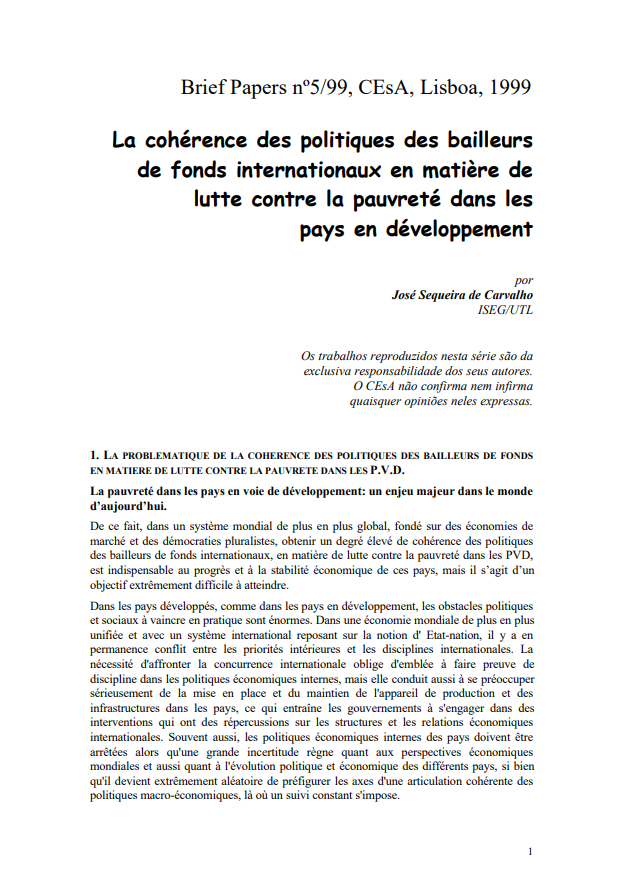
Brief Paper 5/1999: La Cohérence des Politiques des Bailleurs de Fonds Internationaux en Matière de Lutte Contre la Pauvreté dans les Pays en Développement
Abstract:
Poverty in developing countries is a major challenge in today’s world. In La cohérence des politiques des bailleurs de fonds internationaux en matière de lutte contre la pauvreté dans les pays en développement, we explore how in an increasingly global system based on market economies and pluralistic democracies, achieving a high degree of policy coherence among international donors in the fight against poverty in developing countries is essential for the progress and economic stability of these countries, but is an extremely difficult objective to achieve. In both developed and developing countries, the political and social obstacles to be overcome in practice are enormous. In an increasingly unified global economy and with an international system based on the nation-state, there is a constant conflict between domestic priorities and international disciplines. The need to compete internationally requires discipline in domestic economic policies from the outset, but also leads to serious concerns about building and maintaining the productive apparatus and infrastructure within countries, which leads governments to engage in actions that affect international economic structures and relations. In many cases, domestic economic policies have to be decided in the face of great uncertainty about the global economic outlook and political and economic developments in individual countries, making it extremely difficult to predict the direction of coherent macroeconomic policies, where constant monitoring is required.
Quotation:
Carvalho, José Sequeira de. 1999. “La cohérence des politiques des bailleurs de fonds internationaux en matière de lutte contre la pauvreté dans les pays en développement”. Instituto Superior de Economia e Gestão – CEsA Brief papers nº 5-1999.
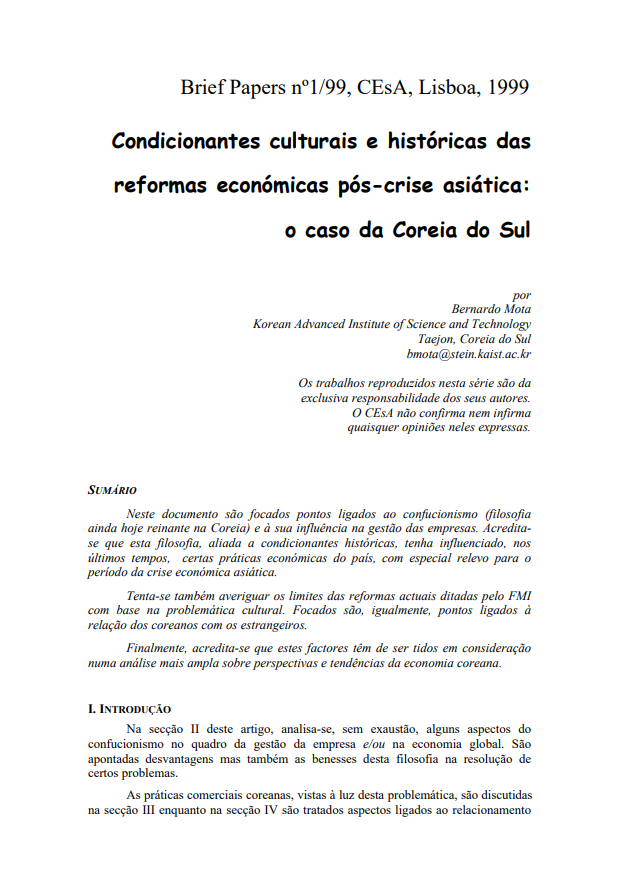
Brief Paper 1/1999: Condicionantes Culturais e Históricas das Reformas Económicas Pós-crise Asiática: O caso da Coreia do Sul
Abstract:
In Condicionantes Culturais e Históricas das Reformas Económicas Pós-crise Asiática: O caso da Coreia do Sul, we focus on Confucianism (a philosophy still prevailing in Korea) and its influence in the management of companies. It is believed that this philosophy, together with historical conditions, has influenced certain economic practices in the country in recent times, with special emphasis on the period of the Asian economic crisis. An attempt is also made to investigate the limits of the current reforms dictated by the IMF on the basis of cultural issues. It also focuses on the relationship between Koreans and foreigners. Finally, it is believed that these factors have to be taken into consideration in a broader analysis of prospects and trends in the Korean economy. It is believed that in an economic or financial analysis of the Korean (and Asian) crisis, its consequences and the outcome of reforms it is indispensable to take into account cultural and historical factors and social specificities. Confucianism is the most influential of these features. Some points of its influence on economic decision-making are reviewed. Certain Confucian features are believed to act as catalysts for economic recovery, and should not be completely dismissed as anachronistic. Korea could become a model of development, combining, in an original way, such divine variables as Confucianism, globalisation and economic liberalisation, on condition that a certain rigour in administration is introduced. Finally, I am convinced that a Confucian society is not incompatible with economic and democratic development in an increasingly global environment.
Quotation:
Mota, Bernardo. 1999. “Condicionantes culturais e históricas das reformas económicas pós-crise asiática : o caso da Coreia do Sul”. Instituto Superior de Economia e Gestão – CEsA Brief papers nº 1-1999
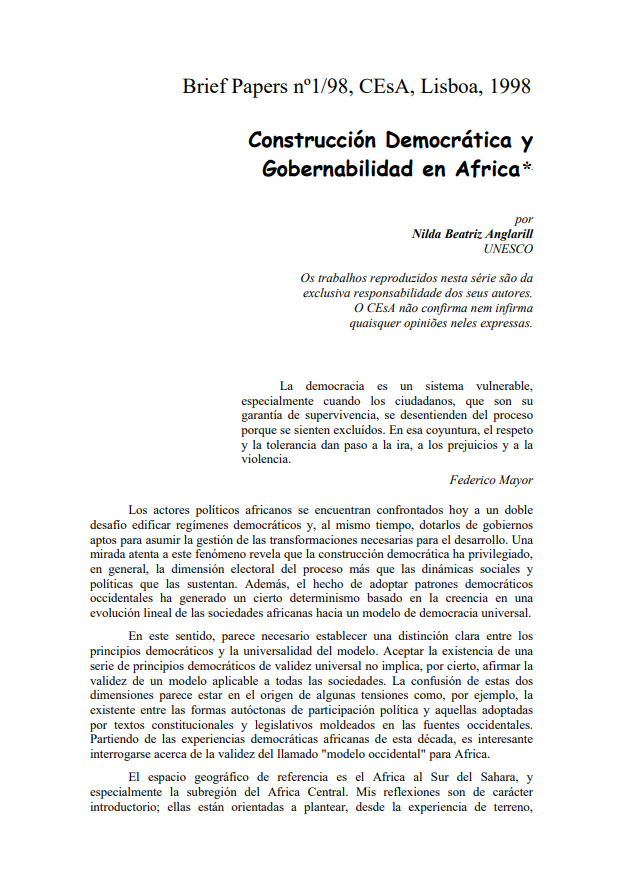
Brief Paper 1/1998: Construccíón Democrática y Gobernabilidad en Africa
Abstract:
African political players are today faced with a double challenge: building democratic regimes and, at the same time, equipping them with governments capable of managing the transformations necessary for development. A close look at this phenomenon reveals that democracy building has generally privileged the electoral dimension of the process rather than the underlying social and political dynamics. Moreover, the adoption of Western democratic standards has generated a certain determinism based on the belief in a linear evolution of African societies towards a model of universal democracy. In this sense, it seems necessary to make a clear distinction between democratic principles and the universality of the model. Accepting the existence of a series of democratic principles of unequivocal validity does not, of course, imply the affirmation of the validity of a model applicable to all societies. Confusion between these two dimensions seems to be at the root of certain tensions, such as that between indigenous forms of political participation and those adopted by constitutional and legislative texts based on Western sources. On the basis of the African democratic experiences of this decade, it is interesting to question the validity of the so-called “Western model” for Africa. Communication at the CESA 1997 Seminar: The Problematic of Development – History and a Transdiciplinary Perspective, Conference Construção Democrática e Contributos Actuais numa Governance em África (Democratic Construction and Current Contributions to Governance in Africa), 23 May 1997.
Quotation:
Comunicação no Seminário CEsA 1997: A Problemática do Desenvolvimento – Historicidade e Contributos Actuais numa Óptica Transdiciplinar, Conferência “Construção Democrática e ‘Governance’ em África”, 23 de Maio de 1997.
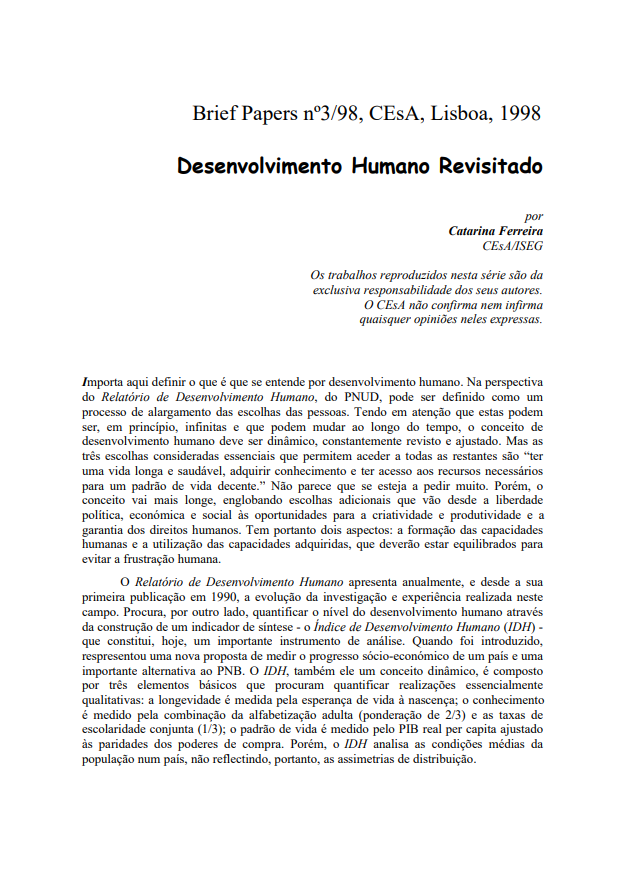
Brief Paper 3/1998: Desenvolvimento Humano Revisitado
Abstract:
Every year since it was first published in 1990, the Human Development Report presents the evolution of research and experience in this field. It also seeks to quantify the level of human development by constructing a synthesis indicator – the Human Development Index (HDI) – which is now an important tool for analysis. When it was introduced, it represented a new proposal to measure the socio-economic progress of a country and an important alternative to the GNP. The HDI, itself a dynamic concept, is made up of three basic elements which seek to quantify essentially qualitative achievements: longevity is measured by life expectancy at birth; knowledge is measured by combining adult literacy (weighting 2/3) and joint schooling rates (1/3); standard of living is measured by real GDP per capita adjusted for purchasing power parities. However, the HDI analyses the average conditions of the population in a country and does not therefore reflect distributional asymmetries. A first version of Desenvolvimento humano revisitado was prepared for Projecfo ED/96/02 Decentralised Cooperation, Fight against Exclusion and Human Development in Portugal, Italy and Belgium, an EC project being prepared by three European NGOs: ACEP – Portugal, Ricerca e Coopcrazione – Italy and ITECO – Belgium.
Quotation:
Ferreira, Catarina. 1998. “Desenvolvimento humano revisitado”. Instituto Superior de Economia e Gestão – CEsA Brief papers nº 3-1998.
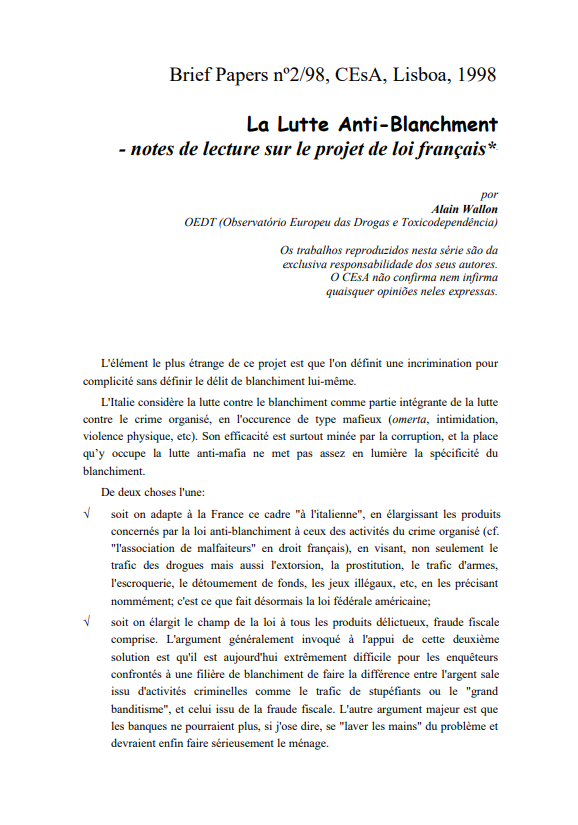
Brief Paper 2/1998: La Lutte Anti-blanchment: Notes de lecture sur le project de loi français
Abstract:
The strangest thing about this draft is that it defines an incrimination for aiding and abetting without defining the offence of money laundering itself. Italy considers the fight against money laundering to be an integral part of the fight against organised crime, in this case of the mafia type (omertà, intimidation, physical violence, etc.). Its effectiveness is mainly undermined by corruption, and the place of the fight against the mafia does not sufficiently highlight the specific nature of money laundering. The tax weapon should not be forgotten. It brought Capone down. It will still be necessary to ensure that the determination to pursue the ordinary citizen in France, sometimes arbitrarily, is transformed with equal efficiency against organised crime. Finally, the participation of banks in the process of defining new rules seems indispensable. La lutte anti-blanchment: notes de lecture sur le project de loi français served as a basis for the lecture “Mundialização, Drogas e Sistema Financeiro” (Globalisation, Drugs and the Financial System) given by Prof. Alain Wallon on 17 March as part of the Master’s in International Development and Cooperation, at the invitation of Prof. René Tapia Ormázabal, in the subject of Financial Systems and Development Finance.
Quotation:
Wallon, Alain. 1998. “La lutte anti-blanchment: notes de lecture sur le project de loi français”. Instituto Superior de Economia e Gestão – CEsA Brief papers nº 2-1998.
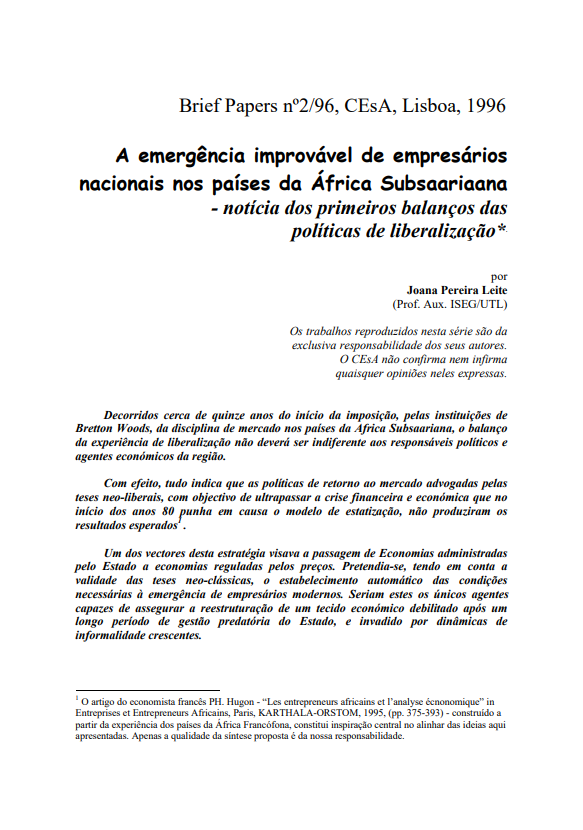
Brief Paper 2/1996: A Emergência Improvável de Empresários Nacionais nos Países da África Subsaariaana: Notícia dos primeiros balanços das políticas de liberalização
Abstract:
About fifteen years after the Bretton Woods institutions started imposing market discipline on the countries of Sub-Saharan Africa, the assessment of the liberalisation experience should not be indifferent to political leaders and economic players in the region. In fact, everything indicates that the policies of return to the market advocated by the neo-liberal theses, with the aim of overcoming the financial and economic crisis which, at the beginning of the 1980s, called the nationalisation model into question, did not produce the expected results. One of the vectors of this strategy was the transition from state-managed economies to price-regulated economies. Taking into account the validity of the neoclassical theses, the aim was the automatic establishment of the necessary conditions for the emergence of modern entrepreneurs. These would be the only agents capable of ensuring the restructuring of a weakened economic fabric after a long period of predatory management by the state, and invaded by growing dynamics of informality. A emergência improvável de empresários nacionais nos países da África Subsaariaana: notícia dos primeiros balanços das políticas de liberalização is not intended to recall the “formal/informal” debate, so dear to the economic literature of the last two decades. Bearing in mind the extreme economic complexity of African societies, the aim is simply to highlight some relevant, though not always evident, aspects of recent reflection on the difficult emergence of the African business class in the context of adjustment policies.
Quotation:
Leite, Joana Pereira. 1996. “A emergência improvável de empresários nacionais nos países da África Subsaariaana : notícia dos primeiros balanços das políticas de liberalização”. Instituto Superior de Economia e Gestão – CEsA Brief papers nº 2-1996

Brief Paper 1/1996: As Fronteiras em África: Contributo para uma reflexão crítica
Abstract:
The role played by political borders in Africa (predominantly inherited from the colonial period) has merited some critical reflections by some authors, both in terms of their role in the construction of the new states and in terms of their impact and consequences in the lives of the populations of the cross-border regions. In As fronteiras em África: contributo para uma reflexão crítica we have two texts, by Daniel Bach and Emmanuel Grégoire, from which short extracts are presented. First, however, a necessarily succinct exposition of their respective theses: For Daniel Bach, Regionalisation tends to be done not by dismantling the barriers that constitute borders, but by taking advantage of the business opportunities originated by these very borders. A second thesis of Bach is that the Structural Adjustment Programmes, by reducing fiscal or customs differences between states, tend to transfer to the external borders of the continent those same business opportunities or the search for them…) and thus accelerate the criminalisation of flows. A first question arises here: the nature of this “regionalisation” of which Daniel Bach speaks, and the text of this author which we quoted above is as follows: “Transstate flows and circuits exercise functions of social regulation and accumulation which are vital for populations faced with the disintegration of official circuits and the regression of the territorial framework of the state”. As for Grégoire, the text offered for our reflection here is taken from a historical and anthropological account of a phenomenon which at first sight is predominantly economic and has the suggestive title: “The Smuggling Paths “Far from being an obstacle to trade, the border which has separated the Hausa country for over twenty years is, on the contrary, a stimulus… On an economic level, its dynamic effects outweigh the negative effects…”.
Quotation:
Statter, Guilherme da Fonseca. 1996. “As fronteiras em África: contributo para uma reflexão crítica”. Instituto Superior de Economia e Gestão – CEsA Brief papers nº 1-1996.





